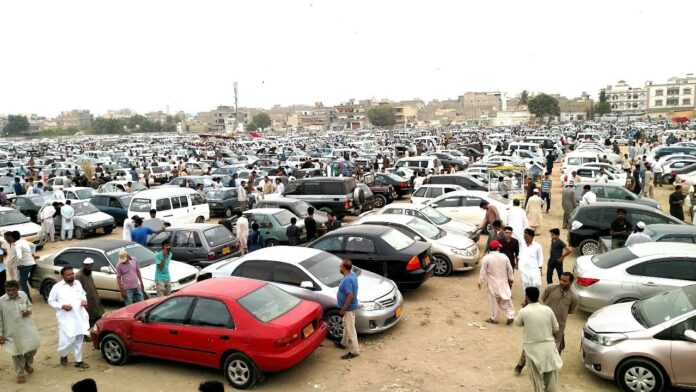Local auto parts manufacturers have raised alarms about a potential shutdown of Pakistan’s car assembly industry within the next two years if the government moves ahead with its plan to liberalise the import of used vehicles starting in September.
As per news reports, Aamir Allawala, former chairman of the Pakistan Association of Automotive Parts and Accessories Manufacturers (PAAPAM), voiced his concerns during a media briefing at various vending units, pointing out that used vehicles already make up 25% of Pakistan’s car market, amounting to over 40,000 units annually. This is in stark contrast to countries like India, where used car market share is zero, 0.3% in Vietnam, and 1.2% in Thailand.
He highlighted the disparity in import duties, noting that while Pakistan’s duties on completely built-up (CBU) units range from 50% to 100%, countries like India impose duties of 125%, Vietnam at 52%, and Thailand at 80%. He argued that the limited imports in these countries are due to both tariff and administrative measures.
Used vehicles, he said, have become the second-largest segment in Pakistan’s car market, surpassing sales from brands like Toyota, Honda, Hyundai, Kia, Haval, MG, and Changan combined. Allawala also pointed to a lack of transparency in the used vehicle market, noting that imports and sales are often undocumented. Payments for imports are routed through hawala, and local sales are largely cash-based, bypassing formal channels and undermining local assemblers and vendors who rely on proper documentation and tax compliance.
Allawala warned that liberalizing used car imports could cost the country around Rs60 billion in lost revenue from local auto parts manufacturers, with the risk of approximately 40,000 jobs being lost in assembly and vending units. He further emphasized that global automakers in Pakistan could shift to importing fully built units, both new and used, leaving local parts vendors without a market.
He also referred to the Auto Policy 2016–21, which incentivized 10 new entrants with a 50% duty concession on locally produced parts, adding that this policy had been detrimental to vendors. According to Allawala, one such assembler earned Rs36 billion in profit in FY25 without significant localization, surpassing established players’ output.
PAAPAM’s Senior Vice Chairman, Shehryar Qadir, urged the government to adopt strategies similar to Thailand and Vietnam to support local vendors and maximize export potential.
Meanwhile, Senator Aon Abbas, Chairman of the Senate Standing Committee on Industries and Production, reiterated the government’s commitment to strengthening domestic manufacturing during a visit to Indus Motor Company (IMC). He emphasized the critical role the local automotive industry plays in industrial growth and job creation.
IMC’s CEO, Ali Asghar Jamali, voiced concerns about the underutilization of the industry’s production capacity, with over 64% remaining idle despite significant investments by global automotive brands.




